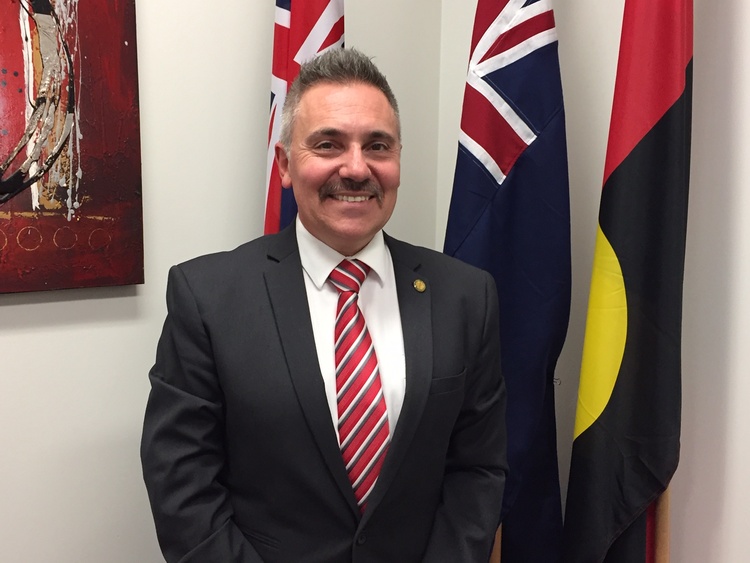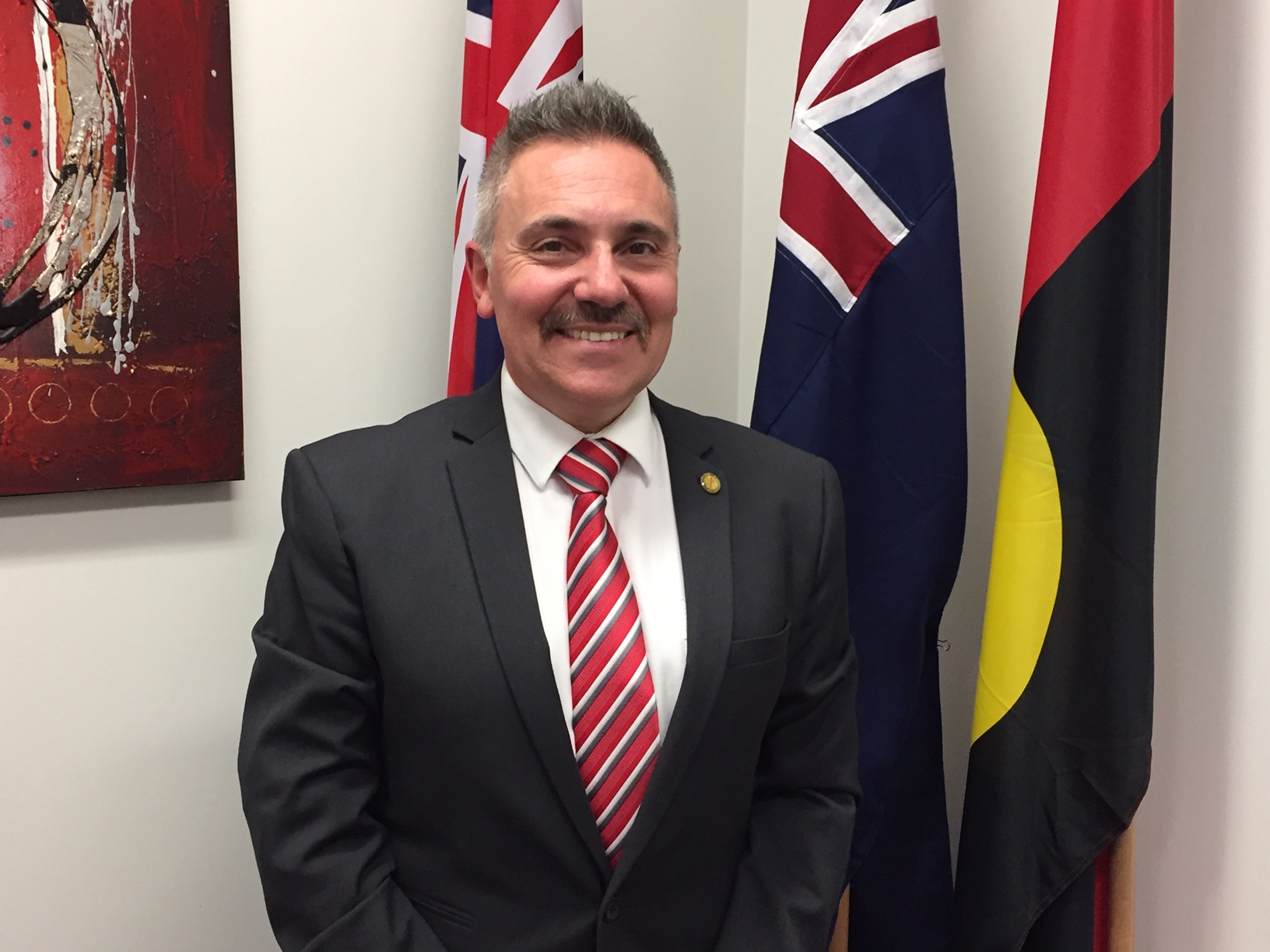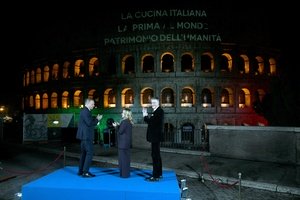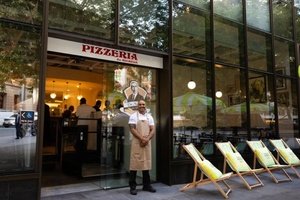One particular person has changed the life of Zangari, who is a man first and foremost, then a politician: his wife Melissa.
“I met her at university,” Zangari says.
“I was studying to become a teacher and Melissa was studying maths.”
When the couple first met, they discovered they had many things in common, the biggest being that they both came from families of Italian fishermen who’d migrated from Sicily.
“Our families knew each other, and not just here in Australia,” Zangari says.
“As we spent more time together, we discovered that our relatives in Sicily knew each other as well.
“People say maybe we’re related in some way ... who knows!”
Despite being born here, Melissa speaks perfect Italian.
“Like me, she studied Italian and gained the highest qualification in Australia,” Zangari says.
The couple’s children have followed in their parents’ footsteps.
“All four have studied or are studying Italian,” Zangari declares.
“Our heritage is important to us.
“We’re proud to be Italian, just as we’re proud to be Australian.
“We’re grateful that this country allows us to be both, respecting our traditions.”
Zangari believes the thing that makes his family feel Italian the most is “the nonni”.
“I used to go to the Apia Club with my nonno to watch the wrestling,” he recounts.
“My nonno loved the fight and was a huge fan of the Italo-Australian champion Mario Milano.
“I believe it’s the same for my children; they’re very close to their grandparents and they wanted to learn Italian to become even closer to them.”
In his personal life, Zangari is passionate about preserving Italian and Catholic traditions.
“We conserve fruit and make wine, salami and passata, like my nonna taught us,” he says.
“We make Italian food at home almost every day and the dining table plays an important role in our family life.”
Then there are the values of the Catholic Church, which were passed on to Zangari not only by his family, but also at school.
“I always studied at Catholic institutions,” he says.
“My mother and grandmother are very religious and they passed on their faith to me.”
But politically speaking, Zangari identifies as a “progressive” who believes in climate change.
“I also believe that the manifestation of its effects is before our eyes,” he says.
“Look at what happened with the recent bushfires.
“The drought season started very early and dramatically.
“The unseasonable wind was strong and unpredictable, making it difficult to put the fires out.”
However, Zangari believes that it’s not just a matter of climate change, and that mankind is also at fault.
What’s more, he says this element of fault is evident in the NSW Parliament.
“The Liberal government of NSW has cut funds for emergency services in this year’s budget along with the number of human resources deployed on the ground, particularly in rural areas and in parklands,” he says.
“We need adequate means to fight fires.
“What is the government doing? It spends $600,000 on a new logo because it’s decided to change the name of the division from ‘NSW Fire & Rescue’ to ‘NSW Fire + Rescue’.
“Not to mention when the firefighters received faulty gas masks last year.
“We need to plan.
“The population is increasing and the drought is worsening, but the funds are falling and they are creating the perfect storm.
“We had planned to hire 200 firefighters.
“For them it’s like ashes in the wind and we’re not moving forward.”
Zangari, who was a secondary school teacher for years before taking on school administrative duties and then entering politics, gets on his high horse when he hears the word “budget”.
“They collected $70 billion with privatisations, and they’ve already blown $14 billion of it,” he says.
“Need I mention the trains bought from South Korea and sent to the Blue Mountains line because they were too big for the city lines ... or the light rail carriages that we import from Spain without considering the NSW industries.
“In Victoria, trains are produced locally; here, we go around the world to buy them at the lowest possible price.
“NSW is selling all its assets to make money and, if it could, it would also sell the chairs on which we sit.
“As a result, it no longer has large sources of income.”
So how can we increase investments?
“The Liberals’ strategy is to make money from driving-related fines and tolls,” Zangari says, before taking a step back in time.
“We had planned to abolish the toll on the M4 as of 2014, once the private partner had been repaid for the investment.
“But when that happened, the Liberals continued the tolls to finance other works.
“Citizens in the suburbs continue to pay, even in terms of inconvenience.
“Now the government has planned to close three railway stations and replace them with trams in the future.”
“For two, maybe three years, there will be replacement buses going to the city.
“I ask myself: ‘What kind of government closes railway stations that are already fully functional?’.”
Zingari maintains his Italianness through a sense of “sociability and enjoying a coffee with friends at a cafe or at home”.
“Italian culture is about the value of sharing,” he says.
“To know how to be with people and to share what you have with them, not only in a material sense.
“Italians have a deep sense of social justice; look at how Sicilians still welcome immigrants today.
“Perhaps this is this Italian spirit that inspires my political choices the most.”
Speaking of social justice, Zangari adds: “The Liberals only think about the Northern Shore.”
“If things are fine there, then everything is fine,” he adds.
“Meanwhile, those in the suburbs – the working class – are dealing with workers’ compensation issues, the closure of businesses and poor services like public transport, which is increasingly expensive and less efficient.
“So much for privatisation!”
But one fact is undeniable: the Liberals have been in power for the past eight years, while Labor has lost.
And when you lose an election, you lose it either because your opponent was better than you or because you were worse than your opponent.
“I propose another theory: part of the electorate believed it would benefit from confirming its confidence in an outgoing government,” Zangari argues.
“But this is not so and time will tell.
“Let’s face it: the Liberals won by a whisker; it was so close that they didn’t even expect to win.”
According to Zangari, the countdown has already begun.
“The next election will bring the Labor Party back to government,” he says.
But will the party be ready?
“Of course it will,” he says.
“We already are and we always will be.
“We are Labor.
“We have clear ideas and plans and we know where we want to go.”
But there is no denying that there’s an internal problem to be addressed: that of the corruption scandal that has hit the party at a state level.
Zangari didn’t shy away from this point.
“It’s true ... there was the problem related to political figures who thought they could act outside the law,” he says.
“But this way of thinking is not of the Labor Party and that’s why those people are out.
“Now the party must look to the future by presenting voters with a clear and transparent agenda that explains who we are and what we do.
“Our most important mission right now is to fight the government and its policies.
“And, I want to clarify that when it comes to morals, the Liberals have nothing to teach anyone, neither in the past nor in the present.”
Labor seems to have taken the first step to solving their internal problems with the election of a new leader, Jodi McKay, who was appointed the role after a three-month trial.
“Having a clear and strong guide helps any movement and brings instant improvements,” Zangari says.
“If we’d had a leader before the election, we would have won, I’m sure.
“Jodi McKay is working well, and so is the team she has chosen.”
Will Anthony Albanese’s leadership bring improvements too?
“Yes; I am convinced that Anthony is a man with a great story to tell,” Zangari concludes.
“Maybe one day in the near future, we will call him our prime minister and he would be the first Italian!”












